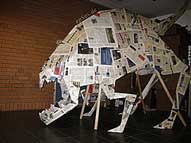NPR censored an essay they asked Barry Eisler to contribute. The topic was “favorite thrillers” and Eisler had chosen 1984 by George Orwell. It’s telling which elements of the essay NPR found so objectionable they needed to censor them.
NPR Editor, Miriam Krule, says that she edited parts of the essay because they were “too political.” In his blog post, Barry includes the paragraphs NPR found objectionable:
As prescient as Orwell was about events, though, I believe his purpose wasn’t so much to forecast the future, which might take many forms, as it was to describe human nature, which is immutable. So no, we don’t have quite the kind of organized Two Minutes’ Hate depicted in the novel, but it’s impossible to recall the populace turning on our NATO ally France before our misadventure in Iraq, or more recently on our NATO ally Turkey over the Gaza flotilla incident, and not remember the scene in the book where a crowd instantly and obediently redirects its hostility from Eurasia to Eastasia. It’s impossible to watch pundits like Tom Friedman, Jeffrey Goldberg, Charles Krauthammer, and Bill Kristol—who were wrong about everything in Iraq—still being taken seriously as this time they agitate for war with Iran, and not imagine the bureaucrats at the Ministry of Truth sending the historical record down the memory hole for incineration. And it’s impossible to look at people who can’t see the obvious parallels I just described and not see Party members vigorously practicing their doublethink, by which they have “the power of holding two contradictory beliefs in one’s mind simultaneously, and accepting both of them.
Most of all, we have the language—the “newspeak”—Orwell predicted. No, there’s no Ministry of Truth, but such an institution would anyway seem superfluous given that The New York Times, USA Today, Wall Street Journal, and Washington Post all now refuse to use the word “torture” to describe waterboarding, beatings, and sleep deprivation of prisoners, adopting instead the government-approved phrase “enhanced interrogation techniques” (as Chris Hayes of The Nation has observed, this is like calling rape “unilateral physical intimacy”). Even NPR, alas, has banned “torture” from its reporting. Escalation in Iraq is a “surge,” prisoners are “detainees,” assassinations are “targeted killings,” and the 60,000 barrel-a-day ongoing undersea oil eruption is nothing but a “spill” or “leak.” As bad as it is, imagine how much worse it might be if Orwell hadn’t warned against it.
It seems obvious to comment on the irony of NPR censoring an essay about 1984 and parallels to today’s establishment media censoring coverage of the United States government. Beyond ironic, it’s sad.
Recommended Reading
You can read Barry Eisler’s post (“Ministry of Truth”) both on the Barry Eisler blog and on Fire Dog Lake, where there is a healthy comment thread going.
You may also want to read about Barry Eisler’s background, which includes three years in a covert position with the CIA’s Directorate of Operations.
For more background information on NPR’s censorship, I recommend Glenn Greenwald’s post about NPR banning the use of the word “torture” to describe…torture.

Comments on this entry are closed.